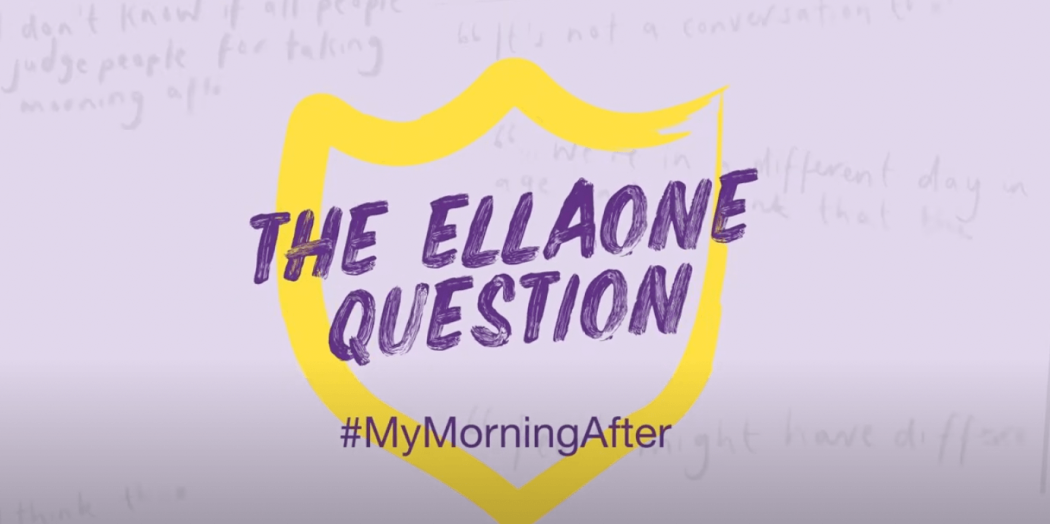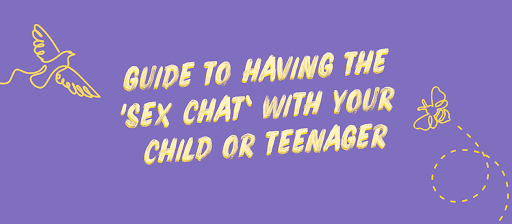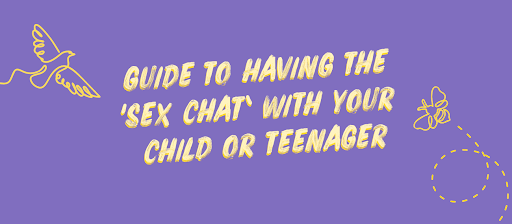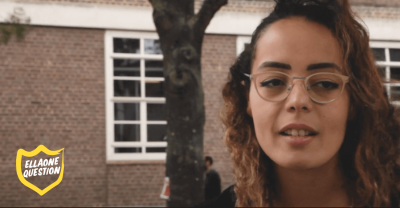Do you remember asking your parents where babies came from? How did they respond? Did you leave the conversation feeling embarrassed, or like sex wasn’t something you should talk about?
At ellaOne®, we’re big believers in open and honest conversations around sex, bodies and contraception. We don’t believe sex should be seen as embarrassing or shameful.
If you have children, you may be thinking about when or if you should talk to them about sex. We know this can be an awkward and intimidating conversation, but we also think it’s really good to start this conversation with kids early on, so that you can create an atmosphere where it feels okay for them to come to you with questions.
The ‘sex chat’ is often awkward because it’s left too late, and because your child can tell that you feel awkward, so they get the message that this is something that people don’t talk about.

Did you have ‘the sex chat’ with one of your parents and can you recall it?
Being able to talk openly about sex makes it so much easier to have positive and fulfilling sexual relationships later on, because the person feels comfortable advocating for their pleasure and, at the same time, is empowered to say no to things that don’t feel good.
We know that it’s easier said than done, so we’ve written this guide to have the ‘sex chat’ with your child or teenager to give you some tips. To help us out, we spoke to Deborah Evans, a pharmacist and sexual health advocate with over 35 years of experience.*
*Deborah Evans does not endorse any products or brands.
When should you start talking to your children about sex?
“Start early,” Deborah says. “Being open about sex from an early age means it doesn’t become a taboo subject later on. You don’t want it to be something that isn’t really talked about and then suddenly it is. It’s also good to use the correct names for body parts.”
It’s important that sex education is age-appropriate, but that doesn’t mean it has to be inaccurate. You don’t need to be graphic, but rather than telling them that a stork flies around dropping babies down chimneys and then having to correct that a few years later – or risk your child picking up false or distorted information elsewhere – it can be a good idea to be factual and let them know about eggs, sperm, vaginas and penises. There are many age-appropriate books and resources available that can help you find the right words.
“It’s also key to make them aware that there are parts of their body that another person should not touch,” says Deborah. “It’s important to let them know that some things aren’t okay and that they can talk to you or a teacher or another trusted adult if someone does touch them in an inappropriate way, or does anything else that makes them uncomfortable – so they know it’s not okay and they have the language to express that.” We know that this isn’t something you want to think about, but giving your children the language to set their own boundaries about their bodies can be really empowering.
How do you talk to your teenager about sex?
“Sex is part of growing up and it’s a good idea to encourage your children to think about responsibilities around that,” says Deborah. “We talk about our mental health and our physical health, but it’s also important to talk about our sexual health. That includes preventing pregnancy, keeping ourselves safe from infections and knowing your options. It’s important for them to be able to seek help if they need it. It’s just making it feel like a normal, comfortable part of everyday life. Therefore the earlier you start, the better.”
Knowledge really is power when it comes to sex and relationships. There are numerous studies that show that sex education can lead to fewer teenage pregnancy and STI transmission because young people have the information they need to keep themselves and each other safe. In 2020, Relationships and Sex Education (RSE) became mandatory in English schools, which is a step in the right direction.
But sex education in schools often only goes so far, and there are many reasons a young person may not feel comfortable asking questions in front of their peers – or talking to their teacher about sex. Positioning sexual health as just another aspect of overall health early on can help negate the idea that talking about sex is embarrassing – and can set your children up for healthier and more fulfilling relationships later on.
What about contraception?
Contraception shouldn’t be embarrassing; using a form of contraception is a responsible decision to help prevent unplanned pregnancy and (in the case of condoms) sexually transmitted infections. Talking about contraception is only awkward if sex is treated as shameful, embarrassing or something that is ‘wrong’. There is evidence that teenagers who have received good quality of sex and relationship education at school are more likely to choose to have sex for the first time later and practice safe sex.
It’s important for young people to know about contraceptives, both so they can protect themselves from unplanned pregnancy and feel empowered to decide if or when they have children, and also so they know that there are multiple contraceptive options out there. No contraceptive is 100% effective and different things work for different people. By knowing what the options are, young people can better advocate for their health and be aware of what else they can ask for.
If your child is interested in contraception, it’s important to help them make an informed decision – rather than making it for them. You don’t have to literally lay out all of the contraceptive options on the kitchen table and give a lecture, but you can point them to resources such as our contraception methods explainer which can help answer any questions they may have.
Emergency contraception (i.e. the morning after pill)
There is still so much misinformation circulating about the morning after pill. Some people think it causes an abortion, whilst others think it can affect long term fertility. These things often come from a misunderstanding about how this medication works, alongside a lack of knowledge about the menstrual cycle in general.
ellaOne®, the UK’s most trusted morning after pill*, works by delaying ovulation, so the egg is not released and any sperm that have entered the body have nothing to fertilise. Emergency hormonal contraceptives containing ulipristal acetate (like ellaOne®) is most effective if taken as soon as possible, but it can be taken up to 5 days (120 hours) after unprotected sex or contraceptive failure.
*Based on sales data. Verify at ellaone.co.uk/verify
Morning after pills containing levonorgestrel can be taken up to 3 days (72) hours after unprotected sex or contraceptive failure.
Both morning after pills are most effective when taken ASAP, as the sooner it’s taken the less likely you are to ovulate before taking it. If you do ovulate before taking the morning after pill, it won’t be effective. It only works by delaying ovulation, so it won’t have an effect on a fertilised egg.
It’s a good idea to make sure your children are aware of emergency contraception options alongside regular contraceptives. This is not to assume they will ever use it, but it’s so they know what their options are in any situation so they are empowered to make an informed decision – and to give helpful advice to their friends if any of them should ever seek it.
Alongside this, it’s a good idea for boys, girls and non-binary teenagers to know how the menstrual cycle works and what happens during ovulation. This means they can have a greater understanding of their bodies and catch any potential health problems earlier on.
—
Sex is a part of life, and we want to see the next generation be empowered with the knowledge to advocate for themselves and feel clued up about their bodies. Sex education doesn’t equal having sex – but it does mean young people have the information they need if/when that does happen for them. In addition to sex and contraception, it’s also great for young people to be able to talk to their trusted adults about their relationships. Your first crush, heartbreak and learning what types of relationships work for you can be really formative and memorable experiences – and being able to share them can make a lot of difference.
ellaOne® 30mg film-coated tablet contains ulipristal acetate and is indicated for emergency contraception within 120 hours (5 days) of unprotected sexual intercourse or contraceptive failure. Always read the label.
Hana® 75µg film-coated tablets contains desogestrel and is an oral contraception for women of child bearing age to prevent pregnancy. Always read the instructions on the package leaflet carefully.







